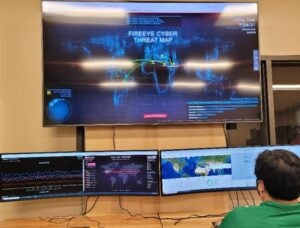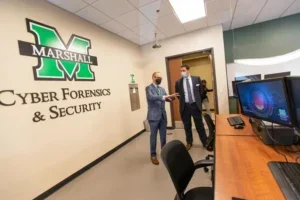An Overview
The Institute for Cyber Security (ICS) was officially launched on October 13th, 2021. Located within the Weisberg Applied Engineering Complex, the institute brings together interdisciplinary academic programs and research opportunities to better serve its students and the field of cyber security.
The ICS offers a Bachelor of Science degree in Cyber Forensics and Security (CFS) and a Master of Science degree in Cyber Forensics and Security, as well as a Master of Science degree in Cybersecurity (CYBR). These programs provide students with a comprehensive education in the technical and legal aspects of cybersecurity, including topics such as network security, digital forensics, and cybersecurity law and policy.
In addition to its academic programs, the ICS also conducts research in the field of cyber security. The institute’s researchers work on a wide range of projects, including developing new technologies for cyber defense and investigating the latest trends in cybercrime. The institute also partners with industry and government organizations to provide research solutions to real-world challenges in the field.
The Institute for Cyber Security is dedicated to providing its students with a top-quality education and to advancing the field of cybersecurity through research and collaboration.
In the News
Marshall University Institute for Cyber Security Ribbon Cutting
October 14, 2021
Marshall University Launches Institute for Cyber Security
October 31st, 2021

Merging Programs
ICS combines two college degrees from two colleges within Marshall University into a single operating unit, allowing for cross-listing of courses, collaborations, and a unified approach to the future of cyber security:
College of Engineering and Computer Sciences (CECS)
College of Science
A History
2008
The Marshall University Institute for Cyber Security’s Cyber Forensics and Security program has a long and storied history. It began its journey back in 2008 as an area of emphasis within the Department of Integrated Technology and Science (IST) with just one professor at the helm. Despite its humble beginnings, the program quickly grew in popularity and reputation, becoming crucial to Marshall University and the broader cyber security community.
Under the guidance of its dedicated faculty and staff, the program has continued to evolve and expand, offering students a comprehensive education in all aspects of cyber forensics and security. From its roots as a small program within IST, the Cyber Forensics and Security program has become a major force in the field, helping to train the next generation of cyber security professionals.

2013
The Digital Forensics and Information Assurance (DFIA) program was launched in 2013 as a way to provide students with a comprehensive education in the field of cyber security. Housed within the College of Science, the program quickly gained popularity and soon became one of the institute’s flagship offerings.
With an average enrollment of 90 students per year, the DFIA program was taught by a team of dedicated professors who were experts in their field. Through a combination of classroom instruction and hands-on learning opportunities, students were able to gain a deep understanding of the principles and practices of digital forensics and information assurance.
The DFIA program was instrumental in helping to establish the institute’s reputation as a leader in the field of cyber security. By providing students with a well-rounded education and real-world experience, the program helped to prepare them for successful careers in this fast-growing and highly important field.

2019
By 2019, the Digital Forensics and Information Assurance (DFIA) program had grown significantly, with the addition of four adjunct faculty members and one full-time staff member. This expansion allowed the program to continue to provide students with a high-quality education and prepare them for successful careers in the field of cyber security. The DFIA program also formed a federal partnership with the Department of Homeland Security. This partnership allowed the program to access cutting-edge resources and expertise and helped to further establish its reputation as a leader in the field.
In 2019, the College of Engineering and Computer Sciences also launched its own B.S. degree in Computer Information Security. This program was designed to provide students with a comprehensive education in the principles and practices of cyber security, with a focus on the technical aspects of the field.k
See: Undergraduate degree in Computer and Information Security to be offered – Marshall University News
In addition to their B.S. degree, the college also launched its M.S. in Cybersecurity program that same year. This program was offered as both an online and face-to-face option, allowing students to choose the format that best suited their needs and schedules. With its rigorous curriculum and experienced faculty, the M.S. in Cybersecurity program has quickly become a popular choice for students looking to advance their careers in the field.

2020
At the beginning of 2020, the Digital Forensics and Information Assurance (DFIA) program took on a new challenge by launching a graduate program in Cyber Forensics and Security (CFS). This new program was designed to provide students with advanced training in the principles and practices of cyber security, focusing on forensic techniques and security measures.
With the launch of the CFS program, the DFIA program was retired and is now known as the Cyber Forensics and Security (CFS) undergraduate and graduate program. This change reflects the program’s continued evolution and growth and its commitment to providing students with the latest knowledge and skills in the field.
The CFS graduate program admitted 14 new students in its first year and gained three graduate assistants. This small but dedicated group of students was eager to learn and ready to tackle the complex challenges of the digital age. With the guidance of experienced faculty and staff, they were well-equipped to succeed in their studies and prepare for successful careers in cyber security.

2021
In 2021, the College of Engineering and Computer Sciences (CECS) and the Cyber Forensics and Security (CFS) programs came together with several external sponsors and collaborators to propose the creation of the Institute for Cyber Security (ICS). This proposal aimed to merge the programs through common goals, expanded funding, and research opportunities.
With the support of the university administration and the broader cyber security community, the proposal was accepted and the Institute for Cyber Security was officially launched on October 13th, 2021. This marked a major milestone for the institute, which brought together two of the university’s leading programs in the field of cyber security under one roof.

2023
Funding
Marshall University has received a $45 million investment from the state of West Virginia to establish a cutting-edge Institute for Cyber Security, enhancing its stature as a leading cyber security academic institution in Appalachia. This initiative, backed by state policy leaders and federal agencies, aims to fortify national cybersecurity defenses, particularly for critical infrastructure. The investment will fund a new facility within Huntington’s 4th Avenue Innovation District, fostering a cyber security ecosystem that will offer advanced training and address the nation’s significant demand for cyber security professionals. The institute is expected to become a pivotal cyber hub for industry training and trend learning in Appalachia and beyond.
Center of Excellence
Marshall University has been recognized as a National Center of Academic Excellence in Cyber Defense Education by the NSA and CISA, valid through 2028. This designation affirms the quality of Marshall University’s cybersecurity programs and aims to attract students to address the skilled labor shortage in cybersecurity. To receive the CAE-CD designation, academic institutions must meet stringent NSA requirements and demonstrate a commitment to producing professionals to secure national infrastructure. The NCAE-C program collaborates with colleges to develop high-standard cybersecurity educational programs, involving community outreach, professional development, and interdisciplinary integration.

2024
New Director
Breaking Ground
Marshall University, in collaboration with various government, academic, and industry partners, has initiated the construction of the $45-million Marshall University Institute for Cyber Security. This institute is a significant step towards establishing the National Center of Excellence for Cyber Security in Critical Infrastructure. The center aims to develop advanced cyber security techniques and train the next generation of experts to protect critical infrastructure and enhance national security. The facility will feature a state-of-the-art operations center and multiple labs, and it represents a collaborative effort to address the growing demand for cyber security professionals in the country. More info.
